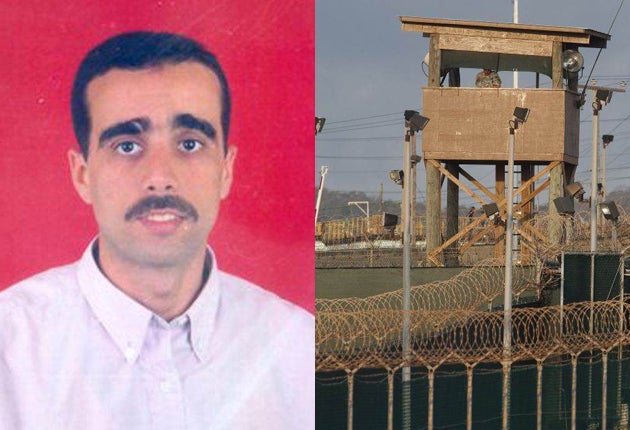Guantanamo prisoner fights forced repatriation
Cleared terror suspect pleads to stay at US prison rather than be returned to Algeria

A former British resident held in Guantanamo Bay for more than eight years has launched a legal battle to stay at the US Navy prison even though he has been cleared for release.
Lawyers for Ahmed Belbacha have submitted an emergency plea to the US courts seeking to prevent his forced return to his home country of Algeria, where he fears he would be tortured by the security services or killed by an Islamic terror network.
He claims that a visit by the US Attorney General, Eric Holder, to Algeria this week will pave the way for his imminent transfer.
Mr Belbacha, a 39-year-old accountant, lived for nearly three years in the seaside town of Bournemouth, Dorset, where he studied English and worked as a hotel porter.
His lawyers have repeatedly asked the UK Government to offer him residency in the UK but these requests have been turned down on the grounds that the Algerian has no automatic right to live in the UK.
Now it emerges that Mr Belbacha has been promised a room in a flat by a Bournemouth resident, and the Massachusetts town of Amherst has offered him refuge in defiance of Congress. So far, however, no government has come forward to help.
His fears about Algeria were confirmed by what his lawyers called an alarming "conviction" delivered in absentia by an Algerian court last November. Reprieve, the UK-based legal charity representing him, described the proceedings as a disgraceful "show trial", where no lawyer was appointed to defend Mr Belbacha.
He was sentenced to 20 years in prison for belonging to an "overseas terrorist group". Despite repeated requests and extensive investigation, Reprieve's lawyers have been unable to discover what he is supposed to have done. The charity says no evidence has been produced to support his "conviction", which his lawyers say appears to be retaliation against Mr Belbacha for speaking out about the inhumane treatment he would be subjected to if sent to Algeria.
Ahmed's lawyer, Tara Murray, said: "As Attorney General Holder travels to Algeria, all signs now point towards Ahmed's imminent forced transfer to torture and persecution. We implore the European nations of Ireland, Luxembourg and the UK to stand up and put an end to Ahmed's agony."
Mr Belbacha arrived in Britain in 1999 and eventually settled in Bournemouth, where he worked in industrial laundries to help pay for his studies. He later took a job at the Swallow Royal Hotel, where the 1999 Labour Party conference was taking place, and, he says, was thanked by the then deputy prime minister John Prescott, whose room he cleaned.
Yesterday a Foreign Office spokesman said: "The five individuals [UK residents formerly held at Guantanamo Bay] on whose behalf we made representations to the US for their release and return, while not UK nationals, had been legally resident in the UK prior to their detention. Although Ahmed Belbacha spent time in the UK, he was never legally resident. He entered the UK illegally, his application for asylum was refused and his appeal was dismissed."
Documents uncovered by Reprieve show that Mr Belbacha is one of 11 children born to a poor family in Algeria. After secondary school he did two years' national service in the Algerian army before studying accountancy and working for the country's main oil company, Sonatrach.
He was also a keen footballer and played for the country's most successful team. His parents, Salah Belbacha and Fatima Boulkrinat, said Mr Belbacha left the country by boat for France, with a normal visa, in the spring of 1999. "He usually contacted us by telephone and also sent money and clothes until September 2001," they said.
Mr Belbacha claims that in July 2001 he was persuaded by friends to go to Pakistan to undertake religious study. While there he crossed the border into Afghanistan.
When the US-led invasion began in response to the September 11 attacks he crossed back into Pakistan. He claims that in December 2001 he was seized by villagers near Peshawar, in northwest Pakistan, and sold to the authorities for a bounty.
American agents took him to a prison camp near Kandahar where, Mr Belbacha says, he was repeatedly beaten. In March 2002 he was flown to what was then Camp X-Ray at the US naval base in Cuba.
A military tribunal alleged that he had associated with the Taliban in Afghanistan and ruled that his detention was justified. But in February 2007 the US said he was free to go because he posed no threat.
A US government spokesman told a newspaper in America this week that there were no plans to repatriate him to Algeria and deemed the legal action to be unnecessary. But Mr Belbacha's lawyers said that this did not amount to an unequivocal promise not to send him home by force.
Join our commenting forum
Join thought-provoking conversations, follow other Independent readers and see their replies
Comments
Bookmark popover
Removed from bookmarks